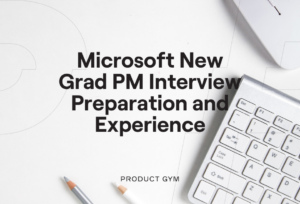Interviews are a lot like public speaking in that they involve presenting your ideas, thoughts, and opinions to a recruiter or hiring manager. And like with addressing an audience, the difference between whether or not you share information effectively is often in the delivery. It takes practice to get this right. But unless you’re applying for jobs left, right, and center, you might not get enough invites to actual interviews to gain experience. That’s where Product Manager mock interviews come in.
A mock interview is an interview preparation exercise that allows you to mimic a job interview. A typical Product Manager mock interview involves two people interviewing one another — an excellent way to put themselves in the right frame of mind and get valuable feedback on your responses.
However, it takes more than just you and a friend throwing questions back and forth to make the Product Manager mock interview practice effective. Everything from the questions you rehearse to the person you choose as a partner should be strategic.
Let’s take it step by step.
1. What Mock Interview Questions Are You Practicing?
It goes without saying that the questions you practice should be one of the most important aspects of your Product Manager mock interviews. So, what makes a mock interview question the right one to practice? As a former tech recruiter, our co-founder Rich Chen stresses the importance of doing your research to make sure you are staying up to date:
“Interview questions for most roles change every three to six months because hiring managers ask questions about problems their company is solving at the moment.”
We’ve put together a guide with all the most recent interview questions to help you get started. Here are a few examples to give you an idea of what to practice in Product Manager mock interviews
Product Manager Mock Interview Question Examples
|
Type |
Interview Question |
|
Background questions |
|
|
“About you” questions |
|
|
Company questions |
|
|
Behavioral questions |
|
|
Technical questions |
|
|
Product management questions |
|
Question Tips for Product Manager Mock Interviews
Be careful not to pick questions that seem great on paper but are not worth your time. That is, focus on the questions that you struggle with, or think you will have the toughest time on, and give less time to those you are confident about.
Remember that the how of it also matters. People tend to wing their mock sessions, choosing questions according to the time they have and what they feel like discussing. Nothing could be more detrimental to progress than taking this approach.
Real preparation involves proper planning, establishing a structure and strategy, and being deliberate learning. Your goal should be to not only get through the questions but to learning how to improve your answers as you go on. In the end, you should be ready for any kind of Product Manager interview.
2. Vet Your Product Manager Mock Interview Answers
There are interview questions that warrant short answers, and those that require one to answer with a longer response. The latter is the most important to get right. Your Product Manager mock interviews will be most helpful if you take the time to develop your long-form answers. They should tick a few boxes:
They Include Stories and Examples
Every answer you give should tie in stories and examples from your past work history. This not only prevents your answer from being dull, it also helps you display your expertise. For example, if an interviewer were to ask a question like, “How do you lead a customer discovery session?” Your answer should give an example of what you’ve done in the past, how you did it, how your team improved on it, and so on. Bringing in the art of storytelling to your interview responses makes them much more interesting and memorable. That means adding in stories from your day-to-day job or situations that relate to the question.
After you tell your interviewer about your customer discovery methods, go ahead and ask, “How do you guys run a customer discovery session at this company?”
This brings us to our next point…
They Engage the Interviewer
A question-answer, question-answer session gets dull really quickly. And if you find it boring, imagine how monotonous and tiresome it must be to the interviewer who has a number of candidates to get through.
Practice including queues like the one above in your responses to open up a dialogue. Having a natural conversation adds a human element to the interview, as opposed to everyone suffering through a robotic interrogation.
At the end of the day, your answers should close interviews into offers. The more natural and comfortable the interview is, the more likely your interviewer will like you and remember you as a candidate. As Rich aptly puts it, “The thing about interviewing is it’s a show. Nobody enjoys interviewing on the hiring side. In fact, they probably hate it more than you who’s on the job hunting side. The person that’s going to make that 30 to 45 minutes more exciting is who they’re going to want to throw their hat behind.”
3. How to Research Your Answers
Obviously, getting your answers right in interviews is vital to success and getting the job offer. But whether you do your mock interviews with a PM in a relevant industry or with a friend you trust as an expert, you never really know if you’re getting it right until you’re in the hot seat answering a real recruiter or hiring manager. This brings us to this fail-proof hack: Practice your answers in real interviews.
You might be thinking, but I don’t get enough offers. This is where Rich recommends applying to companies that are a bit less desirable to you to use the interview sessions as a gauge for your answers. You can find these jobs on popular job platforms like Indeed or LinkedIn.
Your goal should be to interview with as many recruiters as possible, because not only do these people have the most experience with interviews — it’s their job to go through countless interviews day in and day out — they also do not have the time to continue with a candidate they feel might be unsuitable or give feedback. The more interviews you do, the more data you have to assess your responses. Compare them: What questions were you asked? Which answers seemed to be a hit or miss? How did your performance change? What did you do better or worse in different situations?
At the same time, it’s just as difficult to move forward in the interview process for a less favorable company as it is for your dream job. So apart from testing out the responses you and your interview partners come up with, it also helps you get warmed up for interviews for positions you do want.
4. What Makes a Good Mock Interview Partner?
Finding the best sounding board is an important decision. You should look for a professional peer who works in the same industry and has some experience interviewing candidates. And no, your girlfriend/boyfriend, roommate, or parents, are not good candidates. You need partners who are going to give you real, authentic feedback, not ones who will massage your ego. At the same time, a good interview partner is one who takes it just as seriously as you.
Where do you find these people?
- Membership organizations dedicated to finding people jobs — career coaching programs such as ours allow candidates to practice their answers in a professional setting and get professional advice. You can schedule a free call to get a feel of whether or not joining our community makes sense for you.
- Product Manager channels on Slack.
- Professional Facebook groups.
Make sure the person you choose is also actively looking for a Product Manager job and more importantly, that they complement your set of skills. That is, if you’re a more technical person, someone with better soft skills can help you work on your weaker points. At the same time, go for someone who is different from you both in terms of your previous position and work style.
5. How to Conduct a Product Manager Mock Interview Session
You have the key pillars to a constructive mock interview session, but how do you ensure it is successful? What’s more, how do you gain the most value during and after?
Here are some top tips:
- Record Yourself and Play it Back: There’s a lot you can learn about yourself just by watching a video of you doing something. It’s the reason why so many professionals use this tactic — sportsmen, musicians, actors… the list goes on. The best way to truly gauge your performance is to see it played back. This way you can listen to how you sound and understand how you are coming across, which gives you actionable items to improve on or fix.
- Give Yourself Time to Prepare: Most people tend to do mock interviews only when they have an interview coming up, which is usually a few days or weeks to the day. To get the most out of the practice, experts recommend starting around six to eight weeks to the time you intend to start interviewing.
- The More the Better: Don’t shy away from doing many mock interviews. Strive to do as many as possible, whether that’s 40 or 100. Remember, practice makes perfect.
- Create Actionable Goals: Take a look at your strengths and weaknesses and past interview sessions. What do you remember and what do you want to improve on? Create your goals based on these items. Likewise, select your interview partner through relevant criteria.
- Time Your Session: Keeping the timer on helps you practice keeping your answers as concise as possible, stay on track, and avoid wasting time.
At the end of the day, doing Product Manager mock interviews should be as valuable and productive as possible, otherwise they’ll be a waste of time. Need some help getting it right? Why not schedule a free career coaching session with our experts today!




